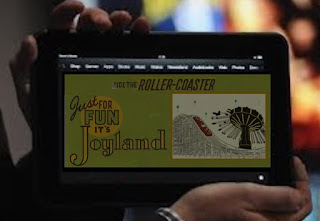I am loving every bit of Joyland -- all of it! -- except that I can't get it on Kindle. I don't even own a Kindle, but I have the app on my computer and can probably read it also on my iphone. So what's to miss?
1. I miss my growing relationship with the language. I would submit to Mr. King that digital books are more than simply a convenience -- they give us a deeper access to words themselves. Though under glass, I actually feel a bit closer to the language. In fact, if a word is confusing I can look it up quickly without worrying if I am spelling it correctly. I do this often with theology books.
2. I miss being able to search the text quickly and accurately. This is an amazing feature I use constantly in work. Being able to find a specific line, or the exact wording of a quote, or even the ability to count the number of times a certain word is used all requires a search feature.
SEARCH would be particularly nice to be able to search "talk" -- as in Carney talk. The word won't appear too often in Joyland outside that reference, so it would allow me to find all the times King gives us those new words. The only other way to make this happen is to take copious notes as I read. It also requires I decide ahead of time what words I'm going to mark and note. With a search feature, you can realize mid novel that something was important and grab up the earlier references.
Finding things is particularly difficult in Joyland, since there is no numbering! You can't make the mental note, "Okay, we're in chapter 7 -- so I need to look up things I just read in chapter 6."
3. I miss the "anywhere" feeling that digital gives. I don't have to decide to take a book with me, if I"ve got it digitally downloaded, it is with me. This is really nice when dealing with lots of cumbersome theology commentaries!
4. I miss seeing others highlights. Kindle allows you to spot passages other readers have marked. This can actually cause me to slow down and go back to a narrative and ask, "now why was that important?" And I see things I'd run right by. This feature is like walking around Disneyland. There is so much to enjoy, you're not always sure what to take in. But when you see a big crowd gathered in on place, you might hover close just to see what the excitement is about. (Actually, at Dland, you thank God the crowd is all mesmerized by something else so you can make a B-line to Space Mountain.)
5. I miss the ability to quickly and correctly quote. Holding a book open (a paperback) is difficult as you try to get each line, each punctuation right. And those of you have read this blog enough know that I often struggle with typos and misspellings. The last thing you want to do is mess up a quote out of a book!
6. I miss spelling. That's right! I miss being able to quickly look up something and see exactly how King punctuated or spelled something. I'm listening to the book at the moment, and the reader read an abbreviation. I wondered if in the book King had abbreviated and the reader just read it out for the sake of the audio book, or if King had written it out also. Of course, I can dig through the paper copy and find it. I've already read over that part in print. But finding is the issue sometimes, right?
7. I miss being able to bookmark several places at once without dog-earing my copy up. Also miss the ability to mark quotes without marking the book itself. But, alas, I broke down and just highlighted the daylights out of this thing!
8. I miss being able to play fruit ninja and subway surfer and look like I'm reading. (This is the same as when we were kids, hiding comics in our school books. Which I never did. never.)









I agree... I like ebooks (and physical books). It surprises me that King made this move when he was a pioneer in the field of ebooks (the Plant).
ReplyDeleteAngie
While I admit digital books have their place, and that place seems pretty much here to stay (bearing in mind the fallibility of technology, of course) I take a much more old fashioned view to reading, which is strange coming from a Gen Xer still in the twenties, but true.
ReplyDeleteIf I had to provide an argument for books over tech, the two sources I'd cite would be Nicholas Carr's The Shallows: What the Internet is doing to our Brains", the book's website is here:
http://www.theshallowsbook.com/nicholascarr/Nicholas_Carrs_The_Shallows.html
and of course Bradbury's Fahrenheit 451.
What it all boils down to for me is the conviction that the mental act of reading a book carries certain benefits for the mind that cyber reading might cripple.
For me, more than Carr it's about building bad reading habits that may stunt are ability to gather and take in all the info of any given text, cyber or paper.
Remember, it was a series of parchment cultures that built Western Civilization, what's more, many of those writers knew how to work in the concept of mathematics into each and every word they used (to give the best example, well, St. John, Dante, maybe Augustine).
As a result, I think there's a corralate between what might be called heavy lifting reading, memorizing pages can help strengthen the memory after all, and the development of intelligence.
Audience:Zzzzzzzzzzzzzzzzzzzzzzzzzzzzzzzz!
ChrisC